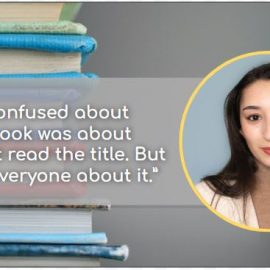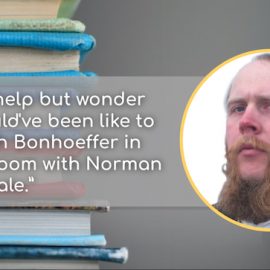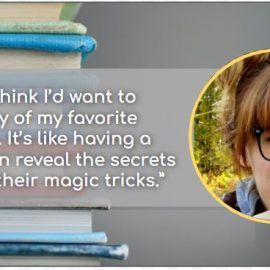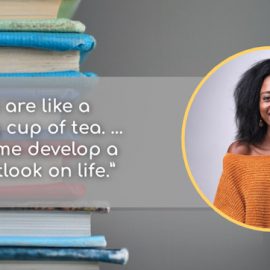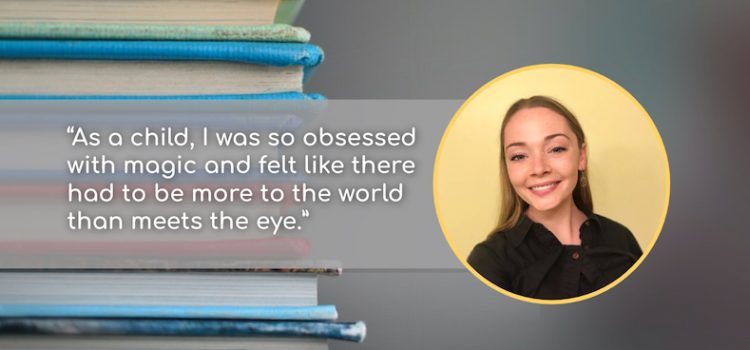
What author’s predictions for humanity are shockingly accurate? What’s wrong with John Green’s romance novels? Why should everyone read the controversial book, Lolita?
Blair could tell you. She’s a book guide writer at Shortform, and we interviewed her recently to learn what she reads and what she loves (or doesn’t love) about these books.
Our Interview With Blair
Blair’s reading has morphed from fantasy to science fiction as she’s gotten older, but she still indulges in a bit of fantasy for lighter reading. Here’s what she had to say in her interview.
What’s your favorite book and why?
My favorite book and series is Dune by Frank Herbert. I feel embarrassed to say that I just started reading the series a few months ago, but, after reading the first book, it immediately rose to the top of my favorites list. I’ve always been a fan of sci-fi and speculative fiction, but the Dune series introduces a level of complexity that goes beyond any other novel I’ve read. The book has a history of humanity spanning over ten thousand years, and the start of that history closely mirrors the state many experts say will be that of our world in the near future. However, the shocking thing about this is that this future would have been outlandish for anyone to conceive of 60 years ago when Herbert wrote the first Dune book.
To elaborate, in the last 10 years or so, experts have realized that the growth rate of technology is vastly different from any other human invention in history—it’s exponential. This means that, while growth has been somewhat small over the last ten years, it will grow more in the next ten years than the average person could even predict. For example, conscious AI technology could become essentially demonetized and democratized; it will be the standard that pretty much everyone would have access to. And how that will progress in the ten years afterward could totally change humanity—society could be unrecognizable.
Herbert predicted all of this roughly 60 years ago, the same year that the very first supercomputer was invented and 20 years before the first consumer computer—that was basically good for only playing Pong—was available. So, it’s not too outlandish to consider his prediction for the state of humanity in 10,000 years as somewhat possible. Without giving away any spoilers, that brings into question what the human mind is truly capable of and whether or not it’s possible for humans to evolve to a higher level of consciousness—another concept that’s being hotly debated by experts in the spiritual and medical communities today. In Dune‘s world, ten thousand years from now, AI and computer technologies no longer exist because humans can be trained to be computers, to navigate highly complex machinery, and to predict the future and other people’s thoughts and motives. While there are many parts of the series that are highly fictional and fantasy-like, many components of human society within the novel spark deep reflections about the state of society today and where we might be heading in the near future.
What are you reading these days?
I like to break up my free time with two books at a time—one book that requires deeper thinking and one that’s more for entertainment. I usually listen to books for entertainment while I drive, run errands, or do chores. I’ve just started reading God Emperor of Dune, and I’m listening to The City of Brass on audio!
If you could have a dinner party with any three authors—dead or alive—who would they be and why?
Frank Herbert—because I find his predictions for humanity to be deeply fascinating and shockingly accurate based on what’s happening in the world today. George Orwell is another person who I think I’d learn a lot from in a single conversation, especially based on 1984 and Politics and the English Language. I’d be really interested to ask his opinion on the political landscape today and what he thinks about particular movements and social justice organizations.
What’s your favorite genre? Why does it intrigue you?
My favorite genre is speculative and science fiction because it makes me think about all the issues and happenings in today’s society, what the consequences of those things might be, whether they’re good or bad, what the right way to handle them is, and what’s truly meaningful to me in the world. The things I determine from that process help me figure out what my short- and long-term goals are and make sure that I’m regularly doing things that feel meaningful to me, even if that just means writing an essay that only a few people will read.
Are there any book genres or tropes that you dislike or refuse to read?
I really dislike romance books, especially John Green books. I feel like a lot of romance books, or at least the ones I’ve had the bad luck to encounter, are based on a few common tropes that I feel are degrading to women or put unrealistic expectations of relationships into people’s heads. First is the damsel in distress novel, where the female main character is essentially helpless or depressed on her own and is saved by some man that she’s basically dependent on to live a happy life. These books are often read by young girls who learn that they need a romantic partner to be happy in life.
The second is a romance book from the man’s perspective (thanks, John Green) where the female love interest is painted as a manic pixy dream girl who has no depth to her character other than to be spontaneous or mysterious, help the male character develop, and then disappear, usually because they end up having some sort of psychological problem—hence Looking for Alaska. I think it gives the wrong message to girls on what they should aspire to be, and, for the boys that read these books, the wrong message on what they should expect from a relationship. It ultimately just romanticizes unhealthy relationships and standards for a young audience that’s vulnerable. And I’ve seen so many instances of teenagers—maybe subconsciously—mimicking the manic pixy dream girl trope or looking for these types of relationships.
What’s your favorite way to read a book?
By far, the physical book! But, for fantasy books that are low-effort to read, I like to listen to audio versions while I’m multitasking.
What book do you think everyone should read in their lifetime?
First, I’d choose Lolita by Vladimir Nabokov because, despite the upsetting content and storyline, it provides insight into the mind of a man who is mentally ill. Pedophilia is an extremely upsetting topic to read about, but I think it gives people the ability to understand and empathize with people that they adamantly disagree with or are even disgusted by. You don’t have to agree with, feel bad for, or support people who do terrible things, but being able to empathize with them allows you to understand why they do what they do from their perspective rather than yours. This is important because certain people—for example, those with ASPD—inherently interpret the world and justify their behaviors differently than the average person because of an illness they were born with. I don’t think it’s right to demonize certain people for things they aren’t able to control. So, I think being able to empathize with these people is necessary in order to prevent bad things from happening, to help them, and to help the people they might harm. Empathy and mental health awareness can go a long way in promoting peace and a safe community.
Also, I’d recommend The Sparrow by Mary Doria Russell because, like Lolita, it forces you to try to understand perspectives that you otherwise may never be able to conceive. It also teaches you to avoid making judgments, even if you think you have all the pieces of the puzzle—because missing one small detail could entirely change a story.
Who are your favorite authors?
Frank Herbert and George Orwell, as I mentioned in the dinner party question. I’ll add Ursula Leguin because, like Herbert, her stories are so reflective of elements of today’s society. I like her especially because she focuses on a lot of cultural elements of society such as how people’s ways of thinking change and develop.
How have your reading tastes changed over the years?
As a child, I was so obsessed with magic and felt like there had to be more to the world than meets the eye, so I really liked reading fantasy. I also didn’t like science fiction that much because I felt like it had a dreary view of the world.
I still like fantasy today, but I don’t like to dedicate my reading time to it; I usually only listen to audio versions while multitasking. On the other hand, science fiction has become my favorite genre and pretty much the only genre of book that I’ll make time to read every day.
Was there a specific book that sparked your love of reading?
I really liked reading the Magic Tree House books as a kid, but I wouldn’t say they sparked my love of reading. What really made me obsessed with books was a fantasy novel I read when I was about nine. It’s The Water Mirror, which is the first book in The Dark Reflections trilogy by Kai Meyer. What really caught my attention was the strong and curious female main character and the enchanting alternate fantasy-universe of Earth. The book originally takes place in Venice, a city I’d always wanted to visit, and then the main character embarks on a journey that takes her to many magical—and sometimes fictional—locations across the planet. Looking back on it, this book might have also contributed to my deep interest in traveling and learning about other cultures. I live nomadically today and dedicate most of my free time to meeting new people and exploring new cities and cultures. The Dark Reflections trilogy was probably one of my first exposures to this type of “adventurous” lifestyle that I decided I wanted to live.
Do you have any guilty-pleasure books?
Fantasy/Faerie books, haha! I’m currently reading The City of Brass, and I really liked Naomi Novik’s and Katherine Arden’s books.
What’s an interesting fact that you learned from a book recently?
I’m currently reading Bold for Shortform and learned that the growth rate of technology is unlike any other innovation in human history because it grows exponentially. So, experts predict that, based on this rate of growth, most of us would be shocked to learn what society will look like twenty years from now.
Have any books you’ve read caused you to make any life changes or to develop any habits?
Building a Second Brain by Tiago Forte has recently inspired me to start keeping highly detailed, organized notes in an external information storage system. I use the Notion app.
What’s your favorite quote from a book or an author?
“The beginning and the end are one. … You live in air but do not see it. A phase has closed. Out of that closing grows the beginning of its opposite.” (Frank Herbert, Children of Dune)
What are your favorite book adaptations and why?
Currently, I really like the Dune adaptation. I think it did a fairly good job of encapsulating the complexity of the book compared to other adaptations.
Are there any lesser-known books that you’ve read that you want others to know exist?
The Sparrow by Mary Doria Russell, which I mentioned earlier. I wouldn’t say this book is “underground” by any means, but I’m surprised by the number of people I recommend it to that haven’t heard of it.
At Shortform, how do you go about working on a book that has viewpoints you don’t agree with?
This is really hard, but I value learning about other perspectives. So, I try to read it as if I’m learning about a new topic for the first time. This helps me avoid judgments that are based on my own opinions.
Are there any books you had to read for Shortform that you thought you wouldn’t like and ended up loving?
Not really. I liked most of them. The ones I thought I wouldn’t like unfortunately didn’t change my mind—haha!
What are your favorite books in the Shortform library and why?
A New Earth and The Power of Now by Eckhart Tolle. While I can’t necessarily get behind every claim that Tolle makes, I really agree with his perspectives on human consciousness, universal energy, and living in the present moment. There are numerous books in the Shortform library that discuss these concepts, but I feel like I personally gained the most from Tolle. I feel like he has the least pushy, judgment-based interpretations about how people should live, act, and interpret the world. I also really like his books because, unlike many other “spiritual guides”—like Vex King, for example. Tolle seems to genuinely believe what he says and shares his insights for the benefit of others, not for wealth or fame.
Blair’s Recommended Reading List
- The Dune series by Frank Herbert
- Lolita by Vladimir Nabokov
- The Sparrow by Mary Doria Russell
About the Series
At Shortform, we want to give our employees names and faces so you can get to know the people who make the magic happen. That’s why we’re doing the Shortform Reads series, where we interview our employees and share their thoughts and opinions. You can check out more employee interviews here.

